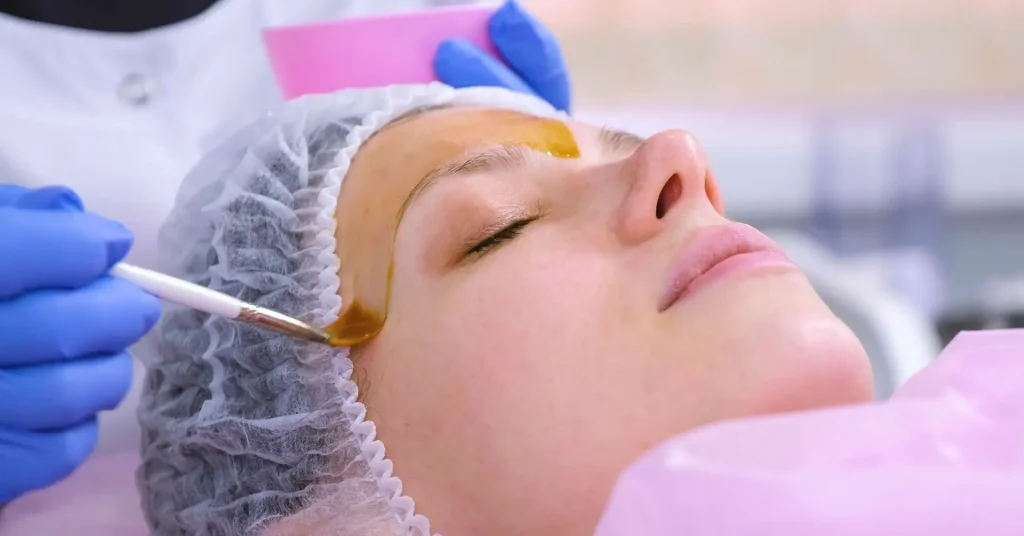If you’re looking for a safe and effective way to rejuvenate your skin, then chemical peels might be just what you need. Chemical peels have been around for a very long time, and the chances are you probably know more than one person who has had one.
But if you are late to the chemical peel game and have been playing with the idea for a while, then here is everything you need to know about chemical peels.
What they are, what they entail and which chemical peel is the perfect one for you.
And let’s go.
What Are Chemical Peels?
Chemical peels are skincare treatments specifically designed to enhance and refine the texture of your skin, and contrary to popular belief, they are not only for your face! In fact, chemical peels can be applied to your neck, back, chest, and hands.
By applying a specialised chemical solution, this skin rejuvenating treatment stimulates the peeling of the outer layer, revealing smoother, more radiant skin beneath. Not only does this process help smooth out fine lines and wrinkles, but it can also significantly improve the appearance of acne scars and skin pigmentation issues (such as sun damage or freckles).
The chemicals used in chemical peels vary depending on the type of peel being performed, but commonly used ingredients include lactic acid, glycolic acid, trichloroacetic acid (TCA), mandelic acid, and salicylic acid.
Benefits Of Chemical Peels
One of the main benefits of chemical peels is that they help reduce wrinkles and fine lines by stimulating collagen production in the deeper layers of the skin. Collagen is an important protein that helps keep skin looking young and healthy.
Another benefit is that chemical peels can help even out discolouration caused by sun exposure or age spots. Additionally, they can be used to treat acne-prone skin by unclogging pores and reducing excess oil production.
Finally, because chemical peels are relatively non-invasive compared to other cosmetic procedures like facelifts or Botox injections, there is no downtime associated with them, so you can return to your daily routine immediately after treatment!
Safety Considerations
When it comes to any medical procedure, especially one involving chemicals, it is important to proceed cautiously and be aware of potential risks or side effects. With that said, there are some safety considerations you should keep in mind when considering getting a chemical peel treatment:
1. Choose A Qualified Professional:
Make sure you go to a certified doctor/dermatologist/aesthetician or a licensed skincare professional, who knows their stuff, from assessing your skin type to picking the perfect peel that suits you best.
2. Disclose Your Skin History:
Always be upfront about your skin’s past and present condition. Tell your doctor/dermatologist/aesthetician about any previous peels, allergies, sensitivities, medications you are taking, and any skin issues like eczema or rosacea. This chat is not just chit-chat, but it is crucial for tailoring a treatment that is right for you (and avoiding any mishaps).
3. Avoid Certain Medications And Products:
Before your peel, you might need to take a break from certain skincare products and medications. Products like retinol, glycolic acid, benzoyl peroxide, especially stronger meds like Accutane could affect your peel’s effectiveness or make your skin overly sensitive. Your doctor/dermatologist/aesthetician will guide you on what to skip.
4. Protect Your Skin From The Sun:
Post-peel, your skin is super sensitive to sunlight, which can lead to serious sunburn or even hyperpigmentation. Keep sun exposure to a minimum and when heading outdoors, be sure to apply a broad-spectrum sunscreen with an SPF of 30 or higher to help shield your vulnerable skin.
5. Follow Post-Peel Instructions:
Stick closely to your post-peel care instructions (this usually means using specific soothing moisturisers, not picking at peeling skin, and keeping hydrated). Following these steps helps your skin heal nicely.
6. Monitor Your Skin’s Response:
Keep an eye on how your skin responds after the peel. A bit of redness and peeling is pretty standard, but if you notice excessive swelling, serious burning, or signs of infection, get on the phone with your doctor/dermatologist/aesthetician right away.
The Way Forward
If you are looking for an effective way to reduce wrinkles and combat signs of ageing on your face or body, consider giving chemical peels a try!
While there are some safety considerations you should keep in mind before undergoing this type of treatment, such as going to a qualified practitioner, the benefits far outweigh any potential risks involved with this procedure.
So why wait any longer? Start looking into how chemical peels can help bring out your best self today!



1 Comment
I started getting chemical peels last year around June as I was getting very bad sunburn marks. They have definitely improved how my skin feels and the glow is to die for. I definitely recommend them to anyone who has sun pigmentation or someone who is starting to get wrinkles. They are less invasive with great results.